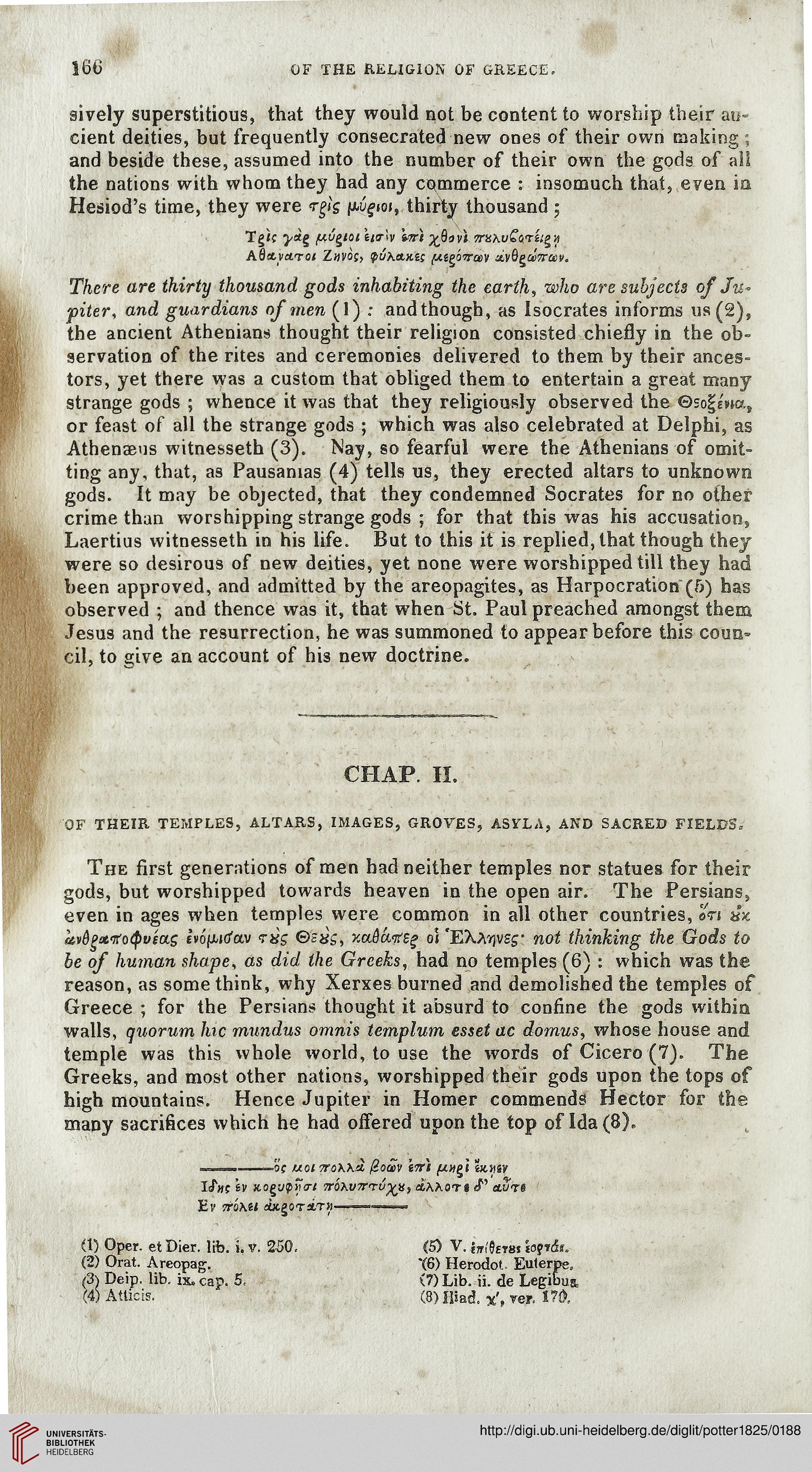16b
of the religion of GREECE.
sively superstitious, that they would not be content to worship their an-
cient deities, but frequently consecrated new ones of their own making ;
and beside these, assumed into the number of their own the gods of all
the nations with whom they had any commerce : insomuch that, even ia
Hesiod's time, they were <rgig fJWfioi, thirty thousand ;
There are thirty thousand gods inhabiting the earth, who are subjects of Ju-
piter, and guardians of men (1) : and though, as Isocrates informs us (2),
the ancient Athenians thought their religion consisted chiefly in the ob-
servation of the rites and ceremonies delivered to them by their ances-
tors, yet there was a custom that obliged them to entertain a great many
strange gods ; whence it was that they religiously observed the ©soS-eW,
or feast of all the strange gods ; which was also celebrated at Delphi, as
Athenaeus witnesseth (3). Nay, so fearful were the Athenians of omit-
ting any, that, as Pausanias (4) tells us, they erected altars to unknown
gods. It may be objected, that they condemned Socrates for no other
crime than worshipping strange gods ; for that this was his accusation,
Laertius witnesseth in his life. But to this it is replied, that though they
were so desirous of new deities, yet none were worshipped till they had
been approved, and admitted by the areopagites, as Harpocration'(ft) has
observed ; and thence was it, that when St. Paul preached amongst them
Jesus and the resurrection, he was summoned to appear before this coun-
cil, to give an account of his new doctrine.
CHAP. II.
of their temples, altars, images, groves, asyla, and sacred fields,
The first generations of men bad neither temples nor statues for their
gods, but worshipped towards heaven in the open air. The Persians,
even in ages when temples were common in all other countries, oti xv.
kv&jjettfoQueas f'vo'fjucfav <nsg €>Exg, v.aQaifeg ol 'EXA'/)V£f not thinking the Gods to
be of human shape, as did the Greeks, had no temples (6) : which was the
reason, as some think, why Xerxes burned and demolished the temples of
Greece ; for the Persians thought it absurd to confine the gods within
walls, quorum hie mundus omnis templum esset ac domus, whose house and
temple was this whole world, to use the words of Cicero (7). The
Greeks, and most other nations, worshipped their gods upon the tops of
high mountains. Hence Jupiter in Homer commends Hector for the
many sacrifices which he had offered upon the top of Ida (8).
Ev iri\U aixgOTatTt)
(1) Oper. et Dier. lib. i. v. 250. (5) V. inheres iofiii.
(2) Orat. Areopag. "(6) Herodot. Euterpe,
(3) Deip. lib. ix. cap. 5. (7) Lib. ii. de Legious,
(4) AtUctS. (8) Iliad, %', rer. 170.
of the religion of GREECE.
sively superstitious, that they would not be content to worship their an-
cient deities, but frequently consecrated new ones of their own making ;
and beside these, assumed into the number of their own the gods of all
the nations with whom they had any commerce : insomuch that, even ia
Hesiod's time, they were <rgig fJWfioi, thirty thousand ;
There are thirty thousand gods inhabiting the earth, who are subjects of Ju-
piter, and guardians of men (1) : and though, as Isocrates informs us (2),
the ancient Athenians thought their religion consisted chiefly in the ob-
servation of the rites and ceremonies delivered to them by their ances-
tors, yet there was a custom that obliged them to entertain a great many
strange gods ; whence it was that they religiously observed the ©soS-eW,
or feast of all the strange gods ; which was also celebrated at Delphi, as
Athenaeus witnesseth (3). Nay, so fearful were the Athenians of omit-
ting any, that, as Pausanias (4) tells us, they erected altars to unknown
gods. It may be objected, that they condemned Socrates for no other
crime than worshipping strange gods ; for that this was his accusation,
Laertius witnesseth in his life. But to this it is replied, that though they
were so desirous of new deities, yet none were worshipped till they had
been approved, and admitted by the areopagites, as Harpocration'(ft) has
observed ; and thence was it, that when St. Paul preached amongst them
Jesus and the resurrection, he was summoned to appear before this coun-
cil, to give an account of his new doctrine.
CHAP. II.
of their temples, altars, images, groves, asyla, and sacred fields,
The first generations of men bad neither temples nor statues for their
gods, but worshipped towards heaven in the open air. The Persians,
even in ages when temples were common in all other countries, oti xv.
kv&jjettfoQueas f'vo'fjucfav <nsg €>Exg, v.aQaifeg ol 'EXA'/)V£f not thinking the Gods to
be of human shape, as did the Greeks, had no temples (6) : which was the
reason, as some think, why Xerxes burned and demolished the temples of
Greece ; for the Persians thought it absurd to confine the gods within
walls, quorum hie mundus omnis templum esset ac domus, whose house and
temple was this whole world, to use the words of Cicero (7). The
Greeks, and most other nations, worshipped their gods upon the tops of
high mountains. Hence Jupiter in Homer commends Hector for the
many sacrifices which he had offered upon the top of Ida (8).
Ev iri\U aixgOTatTt)
(1) Oper. et Dier. lib. i. v. 250. (5) V. inheres iofiii.
(2) Orat. Areopag. "(6) Herodot. Euterpe,
(3) Deip. lib. ix. cap. 5. (7) Lib. ii. de Legious,
(4) AtUctS. (8) Iliad, %', rer. 170.





